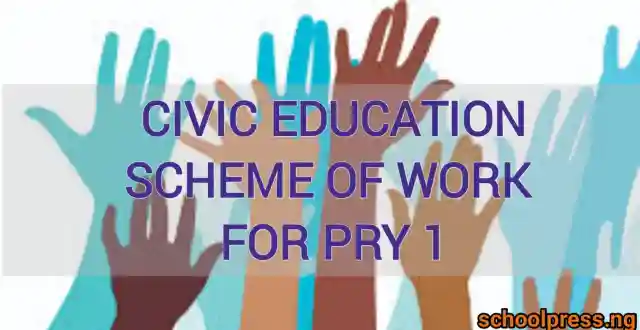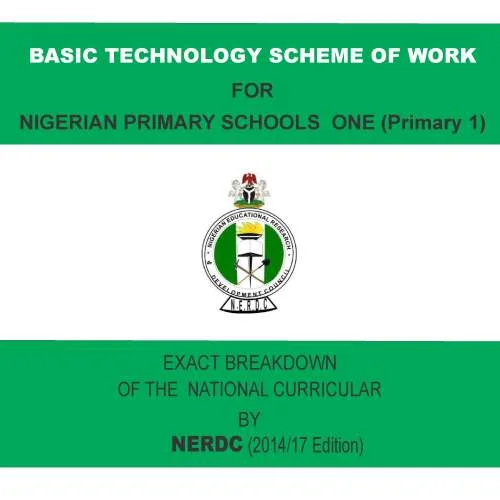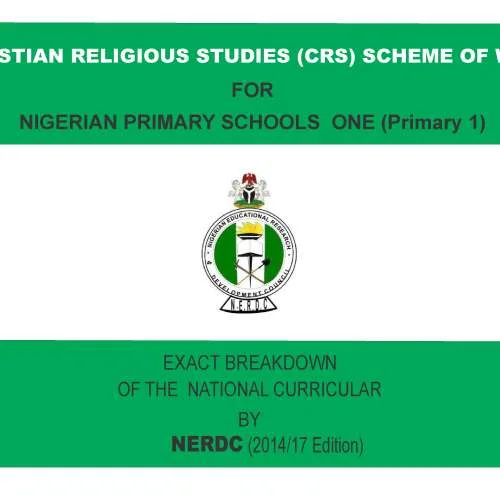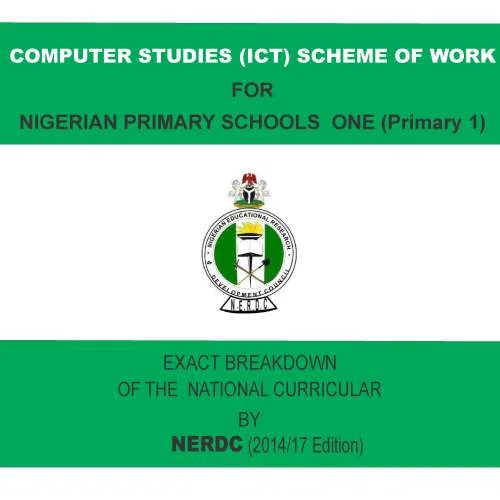SchemeofWork.Com
Access Scheme of work, Curriculum for Primary and Scondary Schools


Geography Scheme of Work SSS3 Lagos State

Geography Scheme of Work SSS2 Lagos State

Geography Scheme of Work SSS1

Radio,Television and Electronics Works Scheme of Work SSS3
Radio,television and electronics works scheme of work sss2.
- Schemes of Work
- Privacy Policy
Civic Education Curriculum for Primary 1
Grade 1 NERDC Civic Education Curriculum for Primary 1. National Consciousness, Rules and Regulations in the Society – Schemeofwork.com
THEME 1: NATIONAL CONSCIOUSNESS
Topic: People, places and objects to respect
Performance objectives
- Pupil should be able to define respect
- Identify people, places and things to respect
- Demonstrate ways of respecting people, places and things
- Feeling of admiration for something or somebody because of their good qualities or achievement.
- polite behavior towards or care for somebody/ thing/place you think is important
- People to Respect: Traditional rulers, Parents, leaders e.g. prefects, principals, Ministers, Commissioners etc.,; Politicians, religious leaders
- Time,, Public properties
- constitution, mace,
- Public building, national flags, Palaces, and utilities
- Respecting people e.g. greetings, running errands, respecting things e.g. standing for the national Anthem
Teacher’s Activities
- Tells pupils stories why we should respect elders and leaders
- Demonstrates how they can show respect in their localities
- Shows pupils charts and pictures of a mosque, church, palace etc. flag, shield, mace and the Nigerian Constitution
Student’s Activities
- Listen to the stories and participate in class discussion
- Look and interpret the pictures and regalia
- Listen and ask questions.
- Demonstrate how to respect, people, places, things and time.
Teaching & Learning Material
- Charts of children greeting their elders in their localities
- Charts and pictures of Mosque, Church and palace etc.
- Pictures of Government properties
- cartoons, textbooks, posters, Video dips
- Visit to important. places e.g. a kings palace, mosque, church, museum, National Assembly
Evaluation Guide
- define the concept of respect
- mention places or objects that should be respected
- mention two reasons why we should respect elders, parents, teachers, staff, religious and political leaders
- demonstrate how to show respect for people, places and things
SUBJECT: CIVIC EDUCATION (BASIC) CLASS LEVEL: PRIMARY 1
THEME 2: GOOD SOCIAL BEHAVIOUR
Topic: Rules and Regulations in the Society
- Pupils should be able to
- explain the meaning of rules and regulations
- mention some of the gains of obeying rules and regulations;
- mention the results of disobeying rules and regulations;
- mention the rules and regulations for food and drug administration
- Meaning of rules and regulations – do’s and don’ts that guide social behavior
- Gains of obeying rules and regulations e.g. love by elders, Gifts from elders and friends, Praise, etc.
- Results of disobeying rules and regulations e.g. unhappiness, punishment, denial of privileges such as food, playing with mates, etc.; rejection by loved one
- NAFDAC laws and Regulations on Food and Drugs Control e.g. Quality Control laws; Laws on sale and use of foods, medicines and cosmetics; Laboratory Laws; Product Registration laws; Importation Laws, etc.
- Leads class discussion on the meaning of rules and Regulations
- Shows pictures/video clips of children receiving gifts and guides discussion on the various gains for obeying rules
- Presents pictures of children suffering from the results of disobeying rules and regulations and leads class discussion on the pictures.
- Discusses the NAFDAC rules and regulations on food and drug control
- Participate in class discussion on rules and regulations
- Interpret the pictures on children receiving gifts and participate in discussion
- Describe pictures of children suffering from the results of disobeying laws
- Pupils’ text book
- Pictures of children receiving gifts
- Video clips
- Pictures of children suffering from the consequences of disobedience
- Food and Drug packs and instructional leaflets
- Pictures and Diagrams of different foods and Drugs
Evaluation Guide
1 Pupils to say what they are expected to do and not to do in their community
2 mention gains of obeying rules and regulations
3 mention results of disobeying rules and regulations
4 mention three rules and regulations of NAFDAC on foods and drugs control
Grade 1 NERDC Social Education Curriculum Primary 1. National Consciousness, Rules and Regulations in the Society – Schemeofwork.com
THEME 3: CIVIC EDUCATION
Topic: Importance of Civic Education
Pupils should be
- Able to discuss the need for Civic Education in Nigeria.
- Mention the topics learnt in Civic Education and their importance.
- Identify some public health enlightenment campaigns as part of civic education.
- Understand democratic and Civic rights and responsibilities.
- Nurture and sustain democracy, etc.
- Learn about systems and institution of government, democratic processes, etc.
- Acquire skills such as active citizenship, inquiry, cooperation, etc.
- Stimulation of civic engagement in the political, social and economic processes.
- Citizens are educated on their multiple roles in society, e.g. as producers and consumers, of goods and services etc.
- Understand Public Health Enlightenment Campaigns on:
- HIV/AIDS Education,
- Drug Abuse Education, etc.
Teacher’s Activities
- Guides discussion on the need for Civic Education
- Leads pupils to mention the topics and specific benefits of learning Civic Education
- Guides the class to identify some ways of public health enlightenment campaigns as part of civic education
- Listen to teacher’s explanations
- Contribute to discussions.
- Identify ways of public health enlightenment campaigns. As part of Civic Education.
- Pictures of a democratic activity and citizens performing some Civic responsibilities in a democracy e.g. senate in session and people voting and campaign
- Video clips on democratic activities
- Radio Jingles
- Video Clips, Posters and Pictures of Public Health Enlightenment Campaigns.
- pupils to: say why it is important to learn Civic Education in Nigeria
- enumerate three topics and benefits derivable from studying Civic Education
- Mention any two public health awareness campaigns.
Civic Education Curriculum for Primary 2
Civic Education Curriculum for Primary 3
Civic Education Curriculum for Primary 4
Civic Education Curriculum for Primary 5
Civic Education Curriculum for Primary 6
NVE: Civic Education Curriculum for Lower Primary School 1 – 3
NVE: Civic Education Curriculum for Upper Primary School 4 – 6
NVE: Civic Education Curriculum for Primary School 1 – 6 (NERDC)
Leave a Reply Cancel reply
Your email address will not be published. Required fields are marked *
Save my name, email, and website in this browser for the next time I comment.
Search for Curriculum and Scheme of work
Nursery scheme of work lagos state.

Letter Work Scheme of Work for Nursery 2 Lagos State

Number Work Scheme of Work for Kindergarten Lagos State

Civic Education Scheme of Work for Nursery 1 Lagos State (Age 3)

Health Habits Scheme of Work for Nursery 2 Lagos State
Science and mathematics scheme of work.

Further Mathematics Scheme of Work SSS 1 Lagos State
Health Education Scheme of Work SSS3 Lagos State

Physical Education Scheme of Work SSS2 Lagos State

Information Technology Scheme of Work SSS 1 Lagos State
Nursery scheme of work federal.

Nursery 2 Scheme of Work Federal (Age 5)
Nursery scheme of work federal (ages 4 – 5 years).

Pre-Primary Scheme of Work Federal
Nursery 1 scheme of work federal (age 4).
Sign in to your account
Username or Email Address
Remember Me

Civic Education Scheme of Work for Primary 1

The Civic Education Scheme of Work for Primary 1 is divided into three modules or topics: “People, places, and objects to respect,” “Ruler and regulations in the society,” and “Importance of Civic Education.” The scheme aims to introduce primary school students to the concepts of respect, rules and regulations, and the significance of civic education in Nigeria.
First Term Civic Education Scheme of Work For Primary 1
Civic Education Scheme of Work for Primary 2
Civic Education Scheme of Work for Primary 3
Second Term Civic Education Scheme of Work For Primary 1
Third term civic education scheme of work for primary 1.
Civic Education Scheme of Work for Primary 4
Civic Education Scheme of Work for Primary 5
Civic Education Scheme of Work for Primary 6
Unique Features Of Civic Education Scheme of Work for Primary 1
To enhance the Civic Education Scheme of Work for Primary 1, we can introduce some unique features and activities that promote active learning, critical thinking, and social engagement:
- Storytelling and Role-Playing: Incorporate storytelling sessions where students hear stories about respectful behaviour and the consequences of disobedience. After the stories, engage students in role-playing scenarios to demonstrate respectful actions in different situations.
- Civic Engagement Projects: Organize small-scale civic engagement projects within the school or local community. For example, students can participate in a community cleanup, visit elderly residents at a local nursing home, or create posters to raise awareness about important issues in their community.
- Cross-Curricular Integration: Integrate civic education with other subjects like language arts, social studies, and art. For example, students can write essays or poems about civic responsibilities, create artwork representing national symbols, or explore historical figures who exemplified civic virtues.
- Current Events Discussions: Discuss current events related to civic values and responsibilities. Encourage students to express their opinions and ideas on how they can contribute positively to society.
- Field Trips: Plan more field trips to relevant institutions such as courts, police stations, fire stations, and government offices. This hands-on experience will deepen students’ understanding of the importance of rules, regulations, and public services.
- Classroom Debates: Organize debates on civic issues, allowing students to research and present arguments on various topics like environmental conservation, community development, or the rights of children.
- Community Guest Speakers: Invite community leaders, public servants, or representatives from non-governmental organizations to speak to the students about their roles and responsibilities in society.
- Interactive Technology: Utilize educational apps, interactive websites, and multimedia resources to make the learning experience more engaging and interactive.
- Cultural Awareness: Include lessons on cultural diversity and the importance of respecting different customs and traditions within society.
- Civic Education Fair: Organize a Civic Education Fair where students can showcase projects, presentations, and creative works related to civic values and responsibilities.
By incorporating these unique elements, the Civic Education Scheme of Work for Primary 1 can become more dynamic, impactful, and empowering for young learners. It will encourage them to actively participate in shaping their communities and becoming responsible citizens with a strong sense of respect and civic duty.
Leave a Reply Cancel reply
Your email address will not be published. Required fields are marked *
Save my name, email, and website in this browser for the next time I comment.

Civic Education Scheme of Work for Primary 1

Civic Education Scheme of Work for Primary 1 is so important for primary school pupils, especially those in Primary 1. In this stage, the students are taught the rudimentary of respect, how to obey rules and regulations and the importance of civic rights and responsibilities.
The Civic Education Scheme of Work for Primary 1 helps the pupils to realize the importance of respect, rules and regulations and the role of government in their lives daily.
The Civic Education Scheme of Work for Primary 1 has three terms, and all have been elaborated based on themes and subthemes. The first term is respect, and under this, pupils learn what respect is as a concept.
Similarly, they learn what should be respected, including things, places, and people. The ways through which respect is shown have been expounded. The second term is focused on rules and regulations and covers the meaning of these concepts.
Pupils learn the benefits of obeying rules and regulations and the consequences of not following or breaking them.
The third term is all about the importance of Civic Education. In this case, pupils learn from the topics under Civic Education, key areas and discussions, and public health enlightenment campaigns.
The Civic Education Scheme of Work for Primary 1 contains a timetable, which is divided into weeks and themes. For each week, a specific number of periods is attributed to Civic Education as a subject.
This timetable provides a good framework for teachers to adhere to. It is also flexible because schools are allowed to alter their pace based on their classes.
Table of Contents
Objectives of civic education scheme of work for primary 1.
First Term Objectives
Week 1-3: Define respect
Week 4- 6: Identify people, places and things to respect
Week 8- 10: Demonstrate ways of respecting people, Places and things
Second Term Objectives
Week 1-3: Explain the meaning of rules and regulations
Week 4- 6: Mention some of the gains of obeying rules and regulations
Week 8- 9: Mention the results of disobeying rules and regulations
Week 10: Mention the rules and regulations for food and drug administration
Third Term Objectives
Week 1-3: Mention the topics learnt in Civic Education and their importance
Week 4- 6: Mention the topics learnt in Civic Education and their importance
Week 8- 10: Identify some Public health enlightenment Campaigns as part of Civic Education
Learning Outcomes of Civic Education Scheme of Work for Primary 1
First-Term Learning Outcomes
Week 1-3: Define the concept of respect
Week 4- 6: Mention places or objects that should be respect and mention two reasons why we should respect elders, parents, teacher, religious and political leaders
Week 8- 10: Demonstrate how to show respect for people, places and things
Second Term Learning Outcomes
Week 1-3: Pupils should Say what they are expected to do and not to do in their community
Week 4- 6: Mention gains of obeying rules and regulations
Week 8- 9: Mention results of disobeying rules and regulations
Week 10: Mention three rules and regulations of NAFDAC on foods and drugs control
Third Term Learning Outcomes
Week 1-3: Pupils should say what is important to Civic Education in Nigeria
Week 4- 6: Enumerate three benefits derivable from studying Civic Education
Week 8- 10: Mention any two public Health enlightenment/awareness Campaigns
Read More On Primary 1 Scheme of Work
Basic Science Scheme of Work For Primary 1
Islamic Religious Studies Scheme of Work for Primary 1
Cultural and Creative Arts Scheme of Work for Primary 1
Basic Technology Scheme of Work for Primary 1
Physical Health Education Scheme of Work For Primary 1
Information Technology Scheme of Work For Primary 1
Mathematics scheme of work for Primary 1
History Scheme Of Work for Primary 1
Christian Religious Studies Scheme of Work for Primary 1
Social Studies Scheme of Work for Primary 1
First Term Civic Education Scheme of Work for Primary 1
Read More: 2024 Jamb Admission List : The Best Way To Check Your Admission Status and More
Second Term Civic Education Scheme of Work for Primary 1
Third term civic education scheme of work for primary 1, teacher’s and pupils activities.
First Term Teacher’s and Pupil’s Activities
Week 1-3: The teacher should tell pupils stories on why we should respect elders and leaders. Pupils should listen to the stories and participate in class discussion
Week 4- 6: The teacher should show pupils charts and pictures of Mosque, Church, Flag, Mace and the Nigerian constitution etc. The pupils should look and interpret the pictures and regalia
Week 8- 10: The teacher with the pupils should demonstrate how to respect: people, places, things and time
Second Term Teacher’s and Pupil’s Activities
Week 1-3: The teacher should lead class discussion on the meaning of rules and regulations. The pupils should participate in class discussion on rules and regulations
Week 4- 6: The teacher should show pictures, videos, clips of children receiving gifts and guide discussion on the various gains for obeying rules. The pupils should interpret the pictures on children receiving gifts and participate in discussion.
Week 8- 9: The teacher should present pictures of children suffering from the results of disobeying rules, regulation and lead class discussion on the pictures. The pupils should describe pictures of children suffering from the results of disobeying laws.
Week 10: The teacher with the pupils should discuss the NAFDAC rules and regulation on food and drug control
Third Term Teacher’s and Pupil’s Activities
Week 1-3: The teacher should guide and discussion on the need for Civic Education. The pupils should listen to teacher’s explanation
Week 4- 6: The teacher should lead pupils to mention the topic and specific benefits of learning Civic Education. The pupils should contribute to discussions by mentioning the specific benefits of learning Civic Education
Week 8- 10: The teacher should guide the class to identify some ways of public health enlightenment campaigns as part of civic education. The pupils should identify ways of public health enlightenment campaigns as part of Civic Education
The Civic Education Scheme of Work for Primary 1 is a well-laid-out program that addresses the significance of respect, obedience to rules and regulations, as well as civic rights and responsibilities to be taught to primary school pupils.
Hence, to ensure that pupils learn and comprehend the Civic Education principles, it is essential that teachers implement the scheme appropriately.
Amazingly, if the students are accorded proper guidance and support in this program, they will develop to be remarkable citizens who impact their societies positively.
Read More: List Of The 53 Accredited Federal Universities in Nigeria- NUC
Mr. Bajepade Roheem Olaitan is the founder of SchoolPress.ng, he is a certified biology teacher, scientific researcher, a blogger, a freelancer, and a website designer
Leave a Reply Cancel reply
Your email address will not be published. Required fields are marked *
Save my name, email, and website in this browser for the next time I comment.
Ken Information Blog

Civic Education Scheme Of Work For Primary One In Nigeria (Govt Approved).
Scheme of work is a general guideline that covers the major themes and concepts in various subjects. It gives the teachers and pupils clear direction on the way to go in their academic work.
This scheme of work covers a range of topics and is designed to provide a comprehensive introduction to civic education subject for pupils at this level. Please note that this outline can be modified according to the specific needs of your school or curriculum.
Below is a generic outline for a Civic Education Primary One (Pupils aged 5-6 years) Duration: One academic term (e.g., 12 weeks) in Nigeria.
Week 1: Introduction to Civic Education
- Definition of Civic Education
- Understanding the importance of being a good citizen
- Basic concepts: honesty, truthfulness, kindness
Week 2: My Family and My Community
- Identifying family members and their roles
- Understanding the community and its members
- How families and communities work together
Week 3: Respecting Others
- Importance of respect in daily interactions
- Respecting elders, teachers, and peers
- Showing respect through words and actions
Week 4: My Country (Nigeria)
- Introduction to Nigeria as a country
- Identifying the Nigerian flag and national symbols
- Recognizing and appreciating cultural diversity in Nigeria
Week 5: Being Responsible
- Understanding responsibilities at home and in school
- Taking care of personal belongings
- Responsibilities towards the environment (e.g., not littering)
Week 6: Understanding Rules and Laws
- Introduction to basic rules at home and in school
- Why rules are important for a safe and orderly society
- Understanding the consequences of breaking rules
Week 7: Resolving Conflicts Peacefully
- Identifying common conflicts in daily life
- Learning to communicate feelings and needs
- Practicing peaceful resolution strategies (e.g., sharing, apologizing)
Week 8: Being Honest and Trustworthy
- Importance of honesty in relationships
- Understanding trust and how it is built
- Telling the truth and admitting mistakes
Week 9: Caring for the Less Privileged
- Recognizing people in need and vulnerable groups
- Acts of kindness and empathy towards others
- How we can help and support those in need
Week 10: Celebrating National Holidays and Events
- Understanding the significance of Independence Day and other national holidays
- Participating in simple activities related to the celebrations
Week 11: Our Heroes and Role Models
- Introducing local and national heroes
- Understanding their contributions to society
- Identifying positive qualities in role models
Week 12: Review and Assessment
- Recapitulation of key concepts covered during the term
- Assessment of pupils’ understanding through quizzes, discussions, and activities
In summary, please note that is important you adapt and customize this scheme of work to suit the specific needs and requirements of your school or educational institution.
It’s also essential to integrate engaging activities and age-appropriate teaching methodologies to keep young learners interested and motivated throughout the duration.
Related Posts
Scheme of work is a general guideline designed to cover the major themes and concepts…
Scheme of work forms the general guideline, designed to cover the major themes and concepts…
Scheme of work forms the basis or guidelines for teaching and learning process in any…
Leave a Reply Cancel reply
Your email address will not be published. Required fields are marked *
Save my name, email, and website in this browser for the next time I comment.
Notify me of follow-up comments by email.
Notify me of new posts by email.
Civic Education Primary 1
On this page, get all Civic Education Primary 1 topics from First Term to Third Term. Find them below, study them, and excel in your examination!
Course Information
Categories: Primary 1
Course Instructor

Student Enrollment
Meaning of civic education, civic education ii, patriotism, cooperation, tolerance, self-reliance, honesty., rights and duties of citizens in the society, public enlightenment campaigns, second term, gains/results of obeying rules and regulations, the result of disobeying rules and regulations, why rules and regulations are necessary, school rules and regulations, result of not obeying government rules and regulations, health issues, people, places and things to respect, people to respect, places to respect, things to respect, share this lesson with your friend.
- Click to share on Twitter (Opens in new window)
- Click to share on Facebook (Opens in new window)
- Click to share on Telegram (Opens in new window)
- Click to email a link to a friend (Opens in new window)
Leave a Reply Cancel reply
Your email address will not be published. Required fields are marked *
Save my name, email, and website in this browser for the next time I comment.
ClassNotes.ng is an Afrilearn brand.
- 08051544949
- [email protected]
- Teach for CN
- Testimonials
- Terms of use
- Privacy Policy
Weekly Newsletter
WhatsApp us

Primary One First Term Civic Education Scheme of Work
By: Sunday | Published on: May 31 | Categories: Lesson Notes | 0 comments

Though, this brief content is for Primary One First Term Civic Education Scheme of Work. However, it is important to state that the extraction was from the complete note of the subject….. Click on the link below to download the lesson note . Check below to download the complete DOCUMENT
Scheme of Work
WEEK 1 – Respect WEEK 2 – People to respect WEEK 3 – Place and things to respect WEEK 4 – Ways of respecting people WEEK 5 – Ways of respecting places and things WEEK 6 – How to respect government properties WEEK 7 – Reasons for respecting elders I WEEK 8 – Reasons for respecting elders II WEEK 9 – Different ways of greetings WEEK 10 – How to respect God and why
To gain full access to the LESSON NOTES: CLICK HERE >> DOWNLOAD FILE
Users Also Read These:

See more results...
You can search for: Admission requirements Cut off mark Subject combination Past questions Download
Recent Posts
- OOU JUPEB Admission For Agricultural Extension
- OOU JUPEB Admission For Agricultural Economics
- OOU JUPEB Admission For Cooperative and Business Management
- OOU JUPEB Admission For Home and Hotel Management
- OOU JUPEB Admission For Animal Production

Product categories
Copyright warnings! Do not copy.
IJMBE Registration Closes Soon. Click Here To Learn More .
Download FREE eBook On The Surest Way To Gain Admission With Low UTME Or Post UTME Score
I will personally send the download link to your email address. Make sure you enter a correct email.
- Login Register
Primary 1 Civic Education Scheme of Work

₦ 200
This is the official Primary 1 Civic Education Scheme of Work for Nigerian Primary Schools. This scheme is based on the latest National Curriculum by NERDC .
Civic Education is a sub-subject under Religious and National Values (RNV) in the new National Curriculum. Religious and National Values is one of the core subjects of Basic Education in Nigeria. Hence, all schools teach Civic Education using this scheme or others drawn in line with this.
Description
- Reviews (0)
CONTENTS This Civic Education Teaching Scheme for Primary One contains all the topics for the three terms in Primary 1. Topics are professionally divided into weeks.
PRODUCTION DATE 2017
CURRICULUM NERDC
COVERAGE Nationwide
WHO BUYS THIS PRODUCT? Schools, teachers, parents and guardians.
HOW WILL YOU GET THE PRODUCT? After you make payment, you will automatically be redirected to where you can download the file. You may login into your account on this website and re-download the scheme any time and as many times as you want up to 1 year.
There are no reviews yet.
You must be logged in to post a review.
Related products

Primary 1 Basic Technology Scheme of Work

Primary 1 CRS Scheme of Work

Primary 1 ICT Scheme of Work
SECOND TERM CIVIC EDUCATION SCHEME OF WORK FOR PRIMARY ONE (1)
Lagos state curriculum for civic education primary one.
Primary one civic education syllabus – Edudelight.com curriculum
TOPIC/SKILL: Rules and regulations
PERFORMANCE OBJECTIVE:
Pupils should able to: explain the meaning of rules and regulations

CONTENT: Meaning of rules and regulations
– Do’s and don’ts that guides social behaviour
TEACHER ACTIVITIES:
class discussion on rules and regulations
PUPILS ACTIVITIES:
Participate in class discussion on rules and regulations
TEACHING AND LEARNING RESOURCE: Pupils textbook
Evaluation guide:.
Pupils to: say what they are expected to do and not to do in their Community.
TOPIC/SKILL: Do’s and don’ts that guide the social behaviour
PERFORMANCE OBJECTIVE: Pupils should be able to:
mention some do’s and don’ts of the community where they belong
Do’s and don’ts that guide the social behaviour of an individual
Leads the pupils to mention the doe’s and don’t of their locality
Participate in the discussion to mention the do’s and don’ts
TEACHING AND LEARNING RESOURCE:
Charts of flash cards containing the do’s and don’ts of the locality
Pupils to: mention two do’s and two don’ts of their locality
TOPIC/SKILL: The gain of obeying rules and regulations
Pupils should be able to:
mention some of the gains of obeying rules and regulations
Gains of obeying rules and regulations e.g. love by elders, gifts from elders and friends, praise etc.
Shows pictures, video clips of children receiving gifts and guides discussion on the various gains for obeying rules
Interpret the pictures, children receiving gifts and participate in discussions
TEACHING AND LEARNING RESOURCE:
1. Pictures of children receiving gifts
2. Video clips
Pupils to: men gains of obeying rules and regulation
TOPIC/SKILL: Results of disobeying rules and regulations
Pupils should be able to: mention the result of disobeying rules and regulations
Results of disobeying rules and regulations
e.g. unhappiness, punishment, denial of privileges such as food, playing with the mates
etc. rejection by loved ones
1. Presents pictures of children suffering from the results of disobeying rules and regulations
2. Leads class discussion on the pictures
Describe pictures of children suffering from the result of disobeying the laws
Pictures of children suffering from the consequences of disobedience
Pupils to: mention results of disobeying rules and regulations
TOPIC/SKILL: Rules and regulations for food and drug, administration
Pupils should be able to: mention the rules and regulations for food and drug administration.
CONTENT: NAFDAC laws on food and drugs control e.g.
– Quality control laws:
– Laws on sale and use of foods, medicine and cosmetics
Discusses the NAFDAC rules and regulations on food and drug control
Participate in class discussion on NAFDAC rules and regulations
1. Food and drug packs and instructional leaflet.
2. Pictures and diagrams of different foods and drugs.
Pupils to: mention three rules and regulations of NAFDAC on food and drugs control.
TOPIC/SKILL: Other laws.
Pupils should be able to: mention other laws that regulate registration, importation and laboratory etc.
Laboratory laws
– Product registration laws
– Importation laws etc.
Discusses the laws that regulate laboratory product registration and importation
Participate in class discussion on the topic
Pictures and diagrams of different foods and drugs
EVALUATION GUIDE: Pupils to: mention the rules and regulations controlling registration of product.
TOPIC/SKILL:
The rules and regulations of the school
Pupils should be able to: Mention the rules and regulations guiding the school.
1. The school’s rules and regulations
– The do’s and don’ts of the school e.g.
– All must put on sandals to school
– Respect the national anthem.
– Punctual to school. The don’ts are:
– Don’t steal
– Don’t fight
– Don’t join cult etc.
Leads the pupils to mention the do’s and don’ts of the school
Reproduce the do’s and don’ts of the school at the command of the teacher
Charts showing the rules and regulations of the school
EVALUATION GUIDE:
Pupils to: mention two do’s and three don’ts of the school.
TOPIC/SKILL: Reward and punishment of the school
PERFORMANCE OBJECTIVE:
Pupils should be able to: name the rewards and punishments awaiting offenders who disobey the school’s rules and regulations
1. Meaning of reward
2. Meaning of punishment
3. Rewards and punishments of the school.
Reward; gifts, award, praise.
Punishment e.g. flogging cutting, grass, expulsion, denial etc.
1. Discusses the meaning of rewards and punishments
2. Leads them to mention some rewards and some punishment of the school
1. Say what reward and punishments means.
2. Mention some rewards and punishments as directed by the teacher
Charts showing rewards and punishments
1. mention two rewards and two punishments
2. mention when rewards and punishments comes in.
TOPIC/SKILL: The rules and regulations of parents
1. tell the rules and regulations of their parents
2. mention their do’s and don’ts , content: the rules and regulations of parents.
– Do’s and don’ts of our parents
– Their likes and dislikes etc.
TEACHER ACTIVITIES: Leads the pupils to mention the do’s and don’ts of their parents
Mention the do’s and don’ts of their parents
Charts showing the do’s and don’ts of our parents
Pupils to: mention the rules and regulations of the parents.
TOPIC/SKILL: Reward and punishments from parents
1. demonstrate the reward and punishments of their parents
2. mention when their parents use rewards and punishment on them.
CONTENT: Parents rewards and punishment e.g.
Rewards
– Praises, buying of gifts, promises etc.
– Punishment:
flogging deprivation, subjection to tedious work etc.
1. Leads the pupils to mention some rewards their parents can present to them
2. Guides the pupils to mention some punishment their parents can give to them
1. Mention the reward and punishments their parents can give to them
2. Demonstrate when they can use rewards and punishments
3. Dramatize rewards and punishments
1. Charts and pictures of those being rewarded
2. Pictures of those being punished
EVALUATION GUIDE: Pupils to:
1. demonstrate the rewards and punishments from parents
2. mention when they can use rewards and punishments for them.
WEEK 11: REVISION
WEEK 12: EXAMINATION
Related Articles

SECOND TERM PHYSICAL AND HEALTH EDUCATION SCHEME OF WORK FOR JSS 3 (BASIC 9)

SECOND TERM SCHEME OF WORK FOR MATHEMATICS NURSERY TWO
First term physical and health scheme of work for primary six (6)/ basic six (6), responsible parenthood, leave a reply cancel reply.
Your email address will not be published. Required fields are marked *
Save my name, email, and website in this browser for the next time I comment.
Privacy Overview
ClassRoomNotes
Week 1 – start april 22nd and end 26th april, 2024.
Welcome Back To School
Third Term Lessons Notes | Third Term Exam Questions | How I spent my Last Holiday | 2023/2024 School Academic Calendar | Join Us @ 080WhatsApp | 080TeleGram and WhatsApp Channel
Civic Education (NVE) Plan Lesson Notes According to the the Lagos State Scheme of Work for Primary 1 (Basic 1) Lesson Notes
CIVIC EDUCATION
NATIONAL VALUES EDUCATION
FIRST TERM, SECOND TERM AND THIRD TERM
PLAN LESSON NOTES
ACCORDING TO THE THE LAGOS STATE
SCHEME OF WORK FOR PRIMARY 1 (BASIC 1)
FIRST TERM CIVIC EDUCATION
TERM 1 CIVIC LESSONS WEEKLY PLAN LESSON NOTES WEEK 1 – MEANING OF CIVIC EDUCATION, Meaning of Civic Education | Why We Study Civic Education Primary 1 (Basic 1) Term 1 Week 1 Civic Education
WEEK 2 – WAYS THROUGH WHICH CIVIC EDUCATION CAN BE IMPORTANT AT SCHOOL, Ways through which Civic Education can be Important at Schools Primary 1 (Basic 1) Term 1 Week 2 Civic Education
WEEK 3 – WAYS THROUGH WHICH CIVIC EDUCATION CAN BE IMPORTANT AT HOME, Ways through which Civic Education can be Important at Home Primary 1 (Basic 1) Term 1 Week 3 Civic Education
WEEK 4 – WAYS THROUGH WHICH CIVIC EDUCATION CAN BE IMPORTANT THROUGH THE MEDIA, Ways through which Civic Education can be Important Through The Media Primary 1 (Basic 1) Term 1 Week 4 Civic Education
WEEK 5 – OTHER WAYS THROUGH WHICH CIVIC EDUCATION CAN BE IMPORTANT – HONESTLY AND SELF RELIANCE, Other ways through which Civic Education can be Important – Honesty and Self Reliance Primary 1 (Basic 1) Term 1 Week 5 Civic Education
WEEK 6 – PATRIOTISM, TOLERANCE AND COOPERATION, Other ways through which Civic Education can be Important – Tolerance, Patriotism and Cooperation Primary 1 (Basic 1) Term 1 Week 6 Civic Education
WEEK 7 – MID TERM TEST AND BREAK, First Term CIVIC EDUCATION Mid Term Test Primary 1 (Basic 1)
WEEK 8 – RIGHTS AND DUTIES OF CITIZENS IN THE SOCIETY, Meaning, Examples and Importance of Rights and Duties of Citizens Primary 1 (Basic 1) Term 1 Week 8 Civic Education
WEEK 9 – Public Enlightenment Campaign – HIV/AIDS Education and Drug Abuse (Primary 1)
WEEK 10 – CONSEQUENCES OF BAD MORALS AND HOW TO CURB THEM, Consequences of Bad Moral and How to Curb or Control Bad Moral Primary 1 (Basic 1) Term 1 Week 10 Social Studies and Civic Education
WEEK 11 – REVISION WEEK 12 – FIRST TERM EXAMINATION, First Term Examination Civic Education Primary 1 (Basic 1) Exam Questions
_________ END OF TERM 1 _________
WELCOME BACK TO SCHOOL
SECOND TERM CIVIC EDUCATION TERM 2 CIVIC LESSONS WEEKLY PLAN LESSON NOTES WEEK 1 – REVISION OF TERM 1 LESSONS AND EXAMINATION, First Term Examination Civic Education Primary 1 (Basic 1) Exam Questions
WEEK 2 – MEANING AND IMPORTANCE OF RULES AND REGULATIONS, Meaning of Rules and Regulations | Importance of Rules and regulations Primary 1 (Basic 1) Term 2 Week 2 Civic Education
WEEK 3 – GAIN OF OBEYING RULES AND REGULATIONS, The Gains of Obeying Rules and Regulations (Primary 1)
WEEK 4 – RESULTS OF DISOBEYING RULES AND REGULATIONS, The Results of Disobeying Rules and Regulations (Primary 1)
WEEK 5 – IMPORTANCE OF SCHOOL RULES AND REGULATIONS, The Rules and Regulations of the School (Primary 1) The Rules and Regulations of the School (Primary 1)
WEEK 6 – WHY RULES AND REGULATIONS ARE NECESSARY
WEEK 7 – MID TERM BREAK
WEEK 8 – RESULTS OF NOT OBEYING GOVERNMENT RULES AND REGULATIONS
WEEK 9 – RESULTS OF NOT OBEYING GOVERNMENT RULES AND REGULATIONS
WEEK 10 – MEANING AND IMPORTANCE OF OBEDIENCE
WEEK 11 – FOOD SAFETY AND GUIDES TO FOOD SAFETY
WEEK 12 – REVISION
WEEK 13 – TERM 2 EXAMINATION, Second Term Examination Civic Education Primary 1 (Basic 1) Exam Questions
_________ END OF TERM 2 _________ ⇓ WELCOME BACK TO SCHOOL
THIRD TERM CIVIC EDUCATION TERM 2 CIVIC LESSONS WEEKLY PLAN LESSON NOTES
WEEK 1 – REVISION OF TERM 2 LESSONS AND EXAMINATION, Second Term Examination Civic Education Primary 1 (Basic 1) – Exam Questions
WEEK 2 – MEANING, EXAMPLES AND IMPORTANCE OF RESPECT, Meaning of Respect (Primary 1)
WEEK 3 – WAYS OF SHOWING RESPECT TO PEOPLE, Ways of Showing Respects to People (Primary 1)
WEEK 4 – PEOPLE TO RESPECT IN THE COMMUNITY, People to Respect in the Community (Primary 1)
WEEK 5 – PEOPLE TO RESPECT IN THE COMMUNITY, People to Respect in the Authority (Primary 1)
WEEK 6 – PRIVATE AND GOVERNMENT BUILDING OR PROPERTY, Places to Respect – Private and Government Buildings (Primary 1)
WEEK 7 – MID TERM BREAK
WEEK 8 – PLACE OF WORSHIP, Places to Respect (Place of Worship) Primary 1
WEEK 9 – PLACE OF INTEREST PART 1, Places to Respect (Place of Interest) Primary 1
WEEK 9 – THINGS TO RESPECT PARTS 2, Things to Respect (Primary 1)
WEEK 10 – HOW TO RESPECT PEOPLE, PLACES, TIME AND THINGS, How to Respect People, Places, Time and Things (Primary 1)
WEEK 11 – REVISION WEEK 12 – TERM 3 EXAMINATION, Third Term Examination Civic Education Primary 1 (Basic 1) – Exam Questions
_________ END OF SESSION _________
RELATED POST
CIVIC EDUCATION Civic Education Lessons for First Term, Second Term and Third Term, Primary 1 Civic Education
Primary 2 Civic Education
Primary 3 Civic Education
Primary 4 Civic Education
Primary 5 Civic Education
Primary 6 Civic Education
National Values Education (NVE) Lagos State Unified Scheme of Work for Primary 1 – 3 2021 Edition.pdf
Share this:
Related posts.

Second Term Civic Education Plan Lesson Notes According to the the Lagos State Scheme of Work and Plan Lesson Notes for Primary 1 (Basic 1) Lesson Notes

Second Term Civic Education Plan Lesson Notes for Primary 1 (Basic 1)
Third term civic education plan lesson notes according to the the lagos state scheme of work and plan lesson notes for primary 1 (basic 1) lesson notes, about the author.
Alabi M. S.
Welcome! We believe teachers inspire our future. CRN (ClassRoomNotes) is a website FOR TEACHERS BY TEACHERS, and we aim to continuously inform and encourage teaching! All materials are subject to TERMLY review.

IMAGES
VIDEO
COMMENTS
1 Pupils to say what they are expected to do and not to do in their community. 2 mention gains of obeying rules and regulations. 3 mention results of disobeying rules and regulations. 4 mention three rules and regulations of NAFDAC on foods and drugs control. Grade 1 NERDC Social Education Curriculum Primary 1.
The Civic Education Scheme of Work for Primary 1 is divided into three modules or topics: "People, places, and objects to respect," "Ruler and regulations in the society," and "Importance of Civic Education.". The scheme aims to introduce primary school students to the concepts of respect, rules and regulations, and the significance ...
FIRST TERM CIVIC EDUCATION SCHEME OF WORK FOR PRIMARY ONE (1). Define civic education. State democratic and civic rights and responsibilities. Pictures of democratic activities and citizens performing some civic responsibilities e.g. people voting. WEEK 2: WAYS THROUGH WHICH CIVIC EDUCATION CAN BE IMPORTANT AT SCHOOL.
Objectives of Civic Education Scheme of Work for Primary 1. First Term Objectives . Week 1-3: Define respect Week 4- 6: Identify people, places and things to respect Week 8- 10: Demonstrate ways of respecting people, Places and things Second Term Objectives. Week 1-3: Explain the meaning of rules and regulations Week 4- 6: Mention some of the gains of obeying rules and regulations
CIVIC EDUCATION FIRST TERM PLAN LESSON NOTES ACCORDING TO THE THE LAGOS STATE SCHEME OF WORK FOR PRIMARY 3 (BASIC 3) WEEKS/CONTENTS LINKS . WEEK 1 - Meaning of Civic Education | Why We Study Civic Education (Primary 1) WEEK 2 - Ways through which Civic Education can be important - Schools (Primary 1) WEEK 3 - Ways through which Civic Education can be important - Home (Primary 1)
EVALUATION GUIDE: Pupils to: 1. demonstrate the rewards and punishments from parents. 2. mention when they can use rewards and punishments for them. WEEK 11: REVISION. WEEK 12: EXAMINATION. Sharing is caring. Facebook. Lagos State Curriculum for Civic Education primary one, Primary one civic education syllabus - Edudelight.com curriculum ...
SECOND TERM CIVIC EDUCATION SCHEME OF WORK FOR PRIMARY FIVE (5)/ BASIC FIVE (5) WEEK 1: REVISION OF FIRST TERM'S WORK. WEEK 2: CIVIC EDUCATION UNITS: Meaning of civic education.Components of civic education. WEEK…. Edudelight.com gives you access to Lesson notes, Lesson Plans, Scheme of work,Curriculum, Exams for Nursery, Primary and ...
Lagos State Scheme of Work for Civic Education primary one. Primary one Civic Education Curriculum - Edudelight.com Scheme of work. WEEK 1. TOPIC/SKILL: Respect. PERFORMANCE OBJECTIVE: Pupils should be able to: define respect. CONTENT: Meaning of respect. a. Feeling of administration for something or somebody because of their good qualities ...
Below is a generic outline for a Civic Education Primary One (Pupils aged 5-6 years) Duration: One academic term (e.g., 12 weeks) in Nigeria. Week 1: Introduction to Civic Education. Week 2: My Family and My Community. Week 3: Respecting Others. Week 4: My Country (Nigeria) Week 5: Being Responsible. Week 6: Understanding Rules and Laws.
Leave a Comment / By ClassPrefect / September 1, 2020. On this page, get all Civic Education Primary 1 topics from First Term to Third Term. Find them below, study them, and excel in your examination! For more class notes, homework help, exam practice, download our App HERE. Join ClassNotes.ng Telegram Community for exclusive content and ...
Though, this brief content is for Primary One First Term Civic Education Scheme of Work. However, it is important to state that the extraction was from the complete note of the subject….. Click on the link below to download the lesson note. Check below to download the complete DOCUMENT
CONTENT: 1. What is democracy. - Government of the people, by the people and for the people. 2. What is democratic rights? - Exercising. leadership from grass root to presidency e.g. councilors, chairman, house of assembly, governor etc.
WEEK 4: WAYS THROUGH WHICH CIVIC EDUCATION CAN BE IMPORANT TO THE MEDIA. LESSON OBJECTIVES: State at least four ways by which civic education can be important through the media. Posters and pictures on the details of an election. State and explain other ways through which civic education can be important.
Civic Education is a sub-subject under Religious and National Values (RNV) in the new National Curriculum. Religious and National Values is one of the core subjects of Basic Education in Nigeria. Hence, all schools teach Civic Education using this scheme or others drawn in line with this. CONTENTS This Civic Education Teaching Scheme for ...
Lagos State Curriculum for Civic Education primary one. Primary one civic education syllabus - Edudelight.com curriculum. WEEK 1. TOPIC/SKILL: Rules and regulations. PERFORMANCE OBJECTIVE: Pupils should able to: explain the meaning of rules and regulations
_____ END OF TERM 2 _____ ⇓ . WELCOME BACK TO SCHOOL THIRD TERM CIVIC EDUCATION TERM 2 CIVIC LESSONS WEEKLY PLAN LESSON NOTES. WEEK 1 - REVISION OF TERM 2 LESSONS AND EXAMINATION, Second Term Examination Civic Education Primary 1 (Basic 1) - Exam Questions WEEK 2 - MEANING, EXAMPLES AND IMPORTANCE OF RESPECT, Meaning of Respect (Primary 1) WEEK 3 - WAYS OF SHOWING RESPECT TO PEOPLE ...
Lagos State Syllabus for Civic Education primary one, Primary one Civic Education Curriculum - Edudelight.com syllabus, Topics: Why study civic education, Democratic rights, Civic rights. ... THIRD TERM CIVIC EDUCATION SCHEME OF WORK FOR PRIMARY ONE (1) 4 minutes read. Sharing is caring. Facebook Messenger Messenger WhatsApp Telegram Line.
Schemes of Work Download; TRCN Past Questions and Answers; Primary School Lesson Notes for First, Second and Third Term Download; National Early Childhood Education Curriculum - NERDC (Ages 0-5 Years) NERDC CURRICULUM FOR PRIMARY SCHOOL; Toddler Scheme of Work for Montessori School; Literature Texts for WAEC/NECO 2021 - 2025 Download